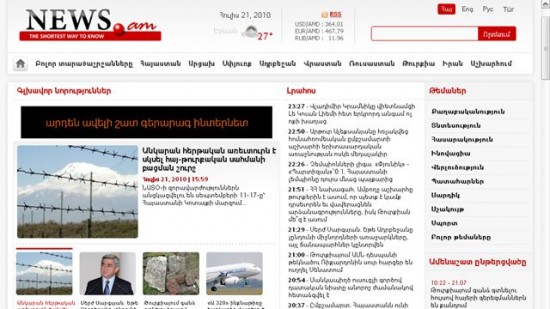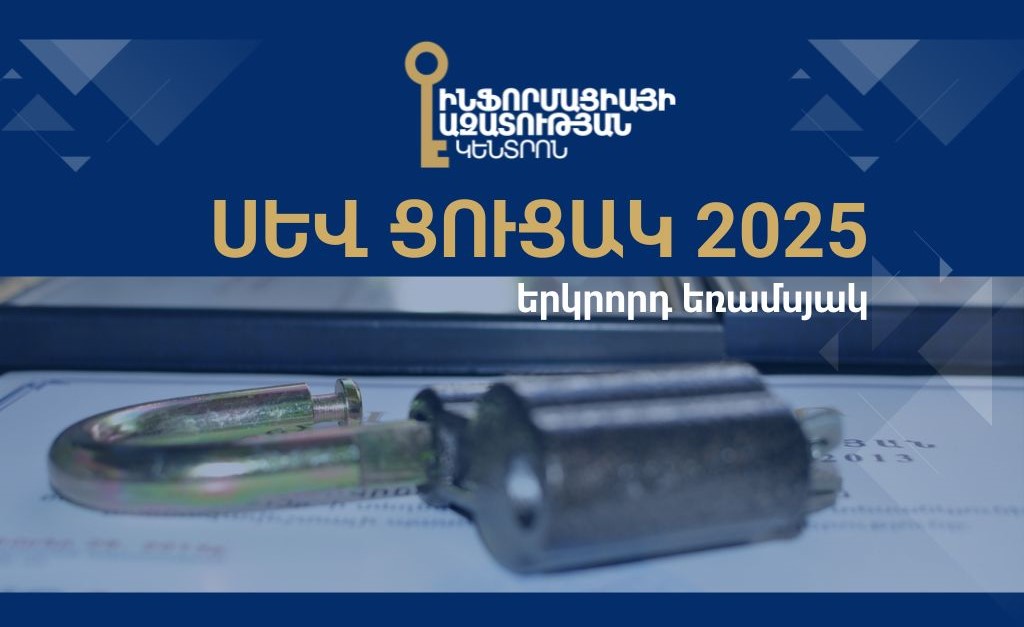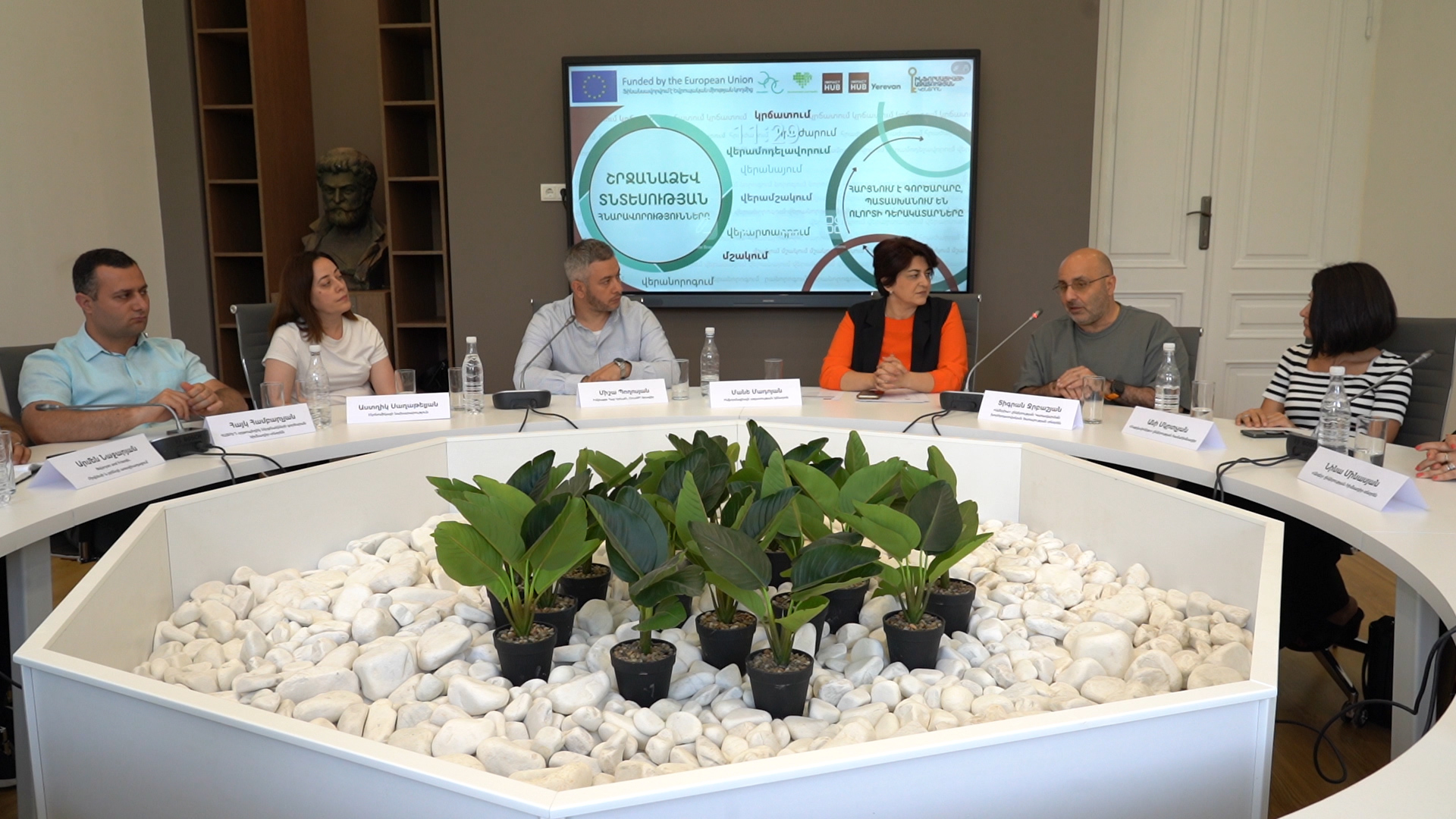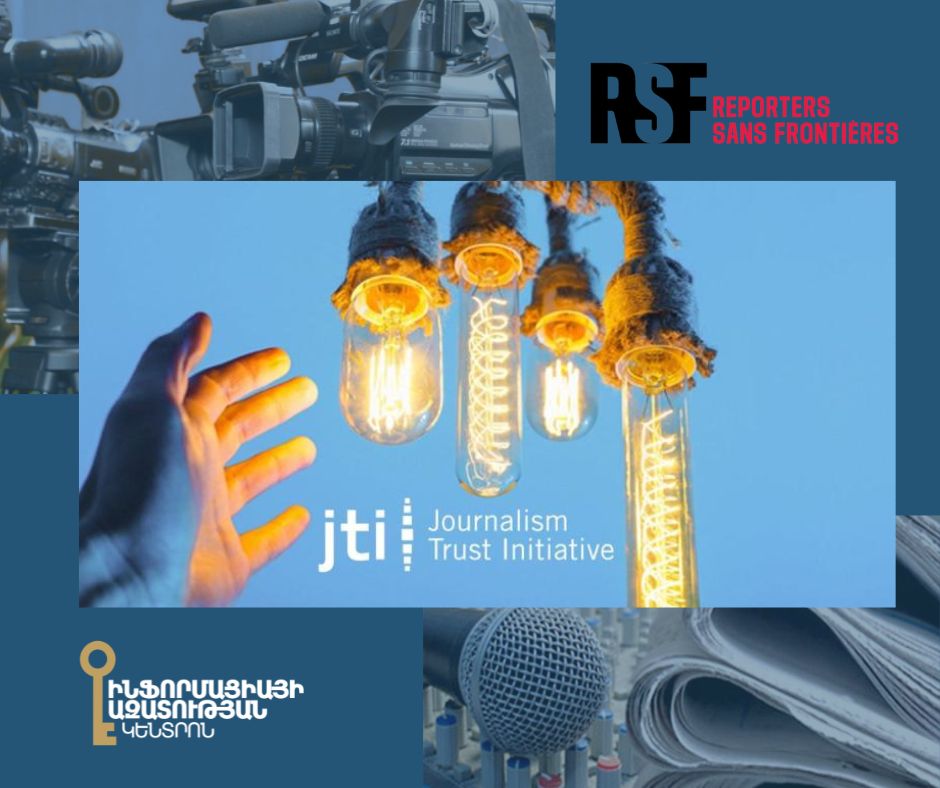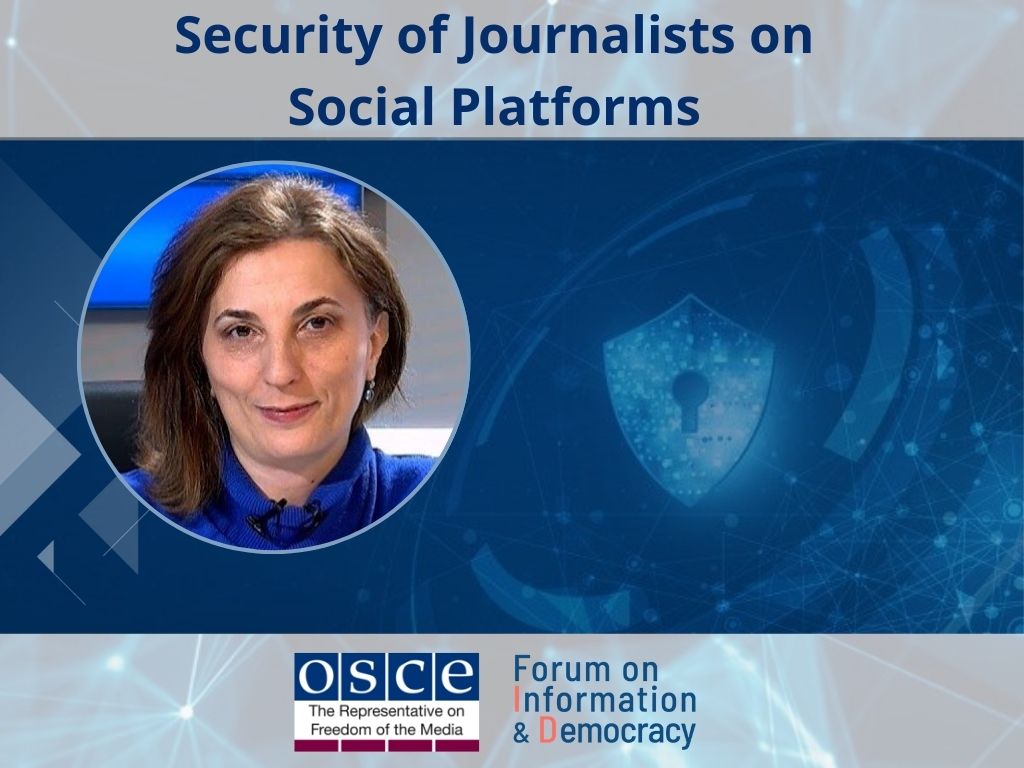On August 14 the Information Disputes Council released its conclusion about the court case Murad Asryan vs “Media Consult” Ltd.
The Expert Conclusion of the Information Disputes Council
On Murad Asryan vs “Media Consult” Ltd. Court Case
1. The Circumstances of the Case
The General Jurisdiction Court of Ajapnyak and Davtashen Districts has under its proceedings the civil case No. ԵԱԴԴ/0231/02/11, as per the application filed by Murad Ararat Asryan (hereinafter referred to as “The Plaintiff”) versus “Media Consult” Ltd (hereinafter referred to as “The Respondent”) demanding protection of honour, dignity and business reputation.
On 04 February 2011 the Respondent published in “news am” website an article entitled “Another court case filed against independent media: a perfect example of illiteracy”. The article includes data, which, in the opinion of the Plaintiff, contain insult directed at him. According to application, these data are as follows:
- “Meanwhile, the court has accepted under its proceedings an application, which amazes with how illiterate it is and with its violations of the law”;
- “Edik Avetisyan had but to provide the plaintiff Murad Asryan, the representative of the Armenian Arythmology and Cardiology Center, with some time to remedy the application’s obvious illiteracy”;
- “The comment, by the way, was unexpected for Murad Asryan and the latter one could not find any reasonable explanation. The judge Edik Avetisyan somehow “prompted to/explained” the lawyer that he should submit a motion and request some time from court, to properly mention the name of the respondent in the application”.
The Plaintiff has mentioned in the application that he, being a member of the Chamber of Advocates of the Republic of Armenia, has a certain perceivable public status, which obliges him to have an impeccable behavior and an exemplary attitude, while the article disseminated by the Respondent provides the readers with misinformation which contains defamation, endangering the objective demonstration of public attitude towards the Plaintiff, as a member of the Chamber of Advocates of the Republic of Armenia. The Plaintiff also finds that the Respondent “did not undertake adequate and efficient means to check the truthfulness of the information and whether or not it corresponds to the reality before publishing the article, otherwise the article would not have been published since the information apparently does not correspondent to the reality”.
Taking into consideration the fact that the information included in the article contains defamation, and based on part 19 of Article 19 and parts 1, 8, and 12 of Article 1087.1 of Armenia’s Civil Code, the Plaintiff has requested that the court obliges the Respondent to publish the Plaintiff’s response on “news.am” website within 3 days following the publication of the verdict, as well as to pay the Plaintiff a compensation in the amount of 2000-fold minimum salary.
The Plaintiff has also presented a motion to the court to change the subject of the application. The motion in particular mentions that “the article would not have been published if the Plaintiff, as a representative of “Arythmology and Cardiology Center of Armenia” Ltd., would not have submitted an application against the Respondent”; “the article contains 2 (two) photos (attached). The photo of the Respondents’ representative mildly speaking differs from the Plaintiff’s photo”; “since 04 February 2011 till the motion’s submission, the article has been placed on the Respondent’s “news.am” website”. By concluding that the article was aimed at humiliating him, the Plaintiff has changed the amount of the requested damage award, demanding that the Plaintiff’s response to the article be published by the Respondent on
“news.am” website within 3 days following the publication of the verdict and to charge in favour of the Plaintiff, one million drams each as amounts compensating for insult and defamation respectively.
On 04 March 2011, the General Jurisdiction Court of Ajapnyak and Davtashen Districts of Yerevan adopted a decision to return the application submitted by the Plaintiff regarding honour, dignity and business reputation, as well as the attached documents.
In accordance with the decision of the Republic of Armenia Civil Court of Appeal dated 29 March 2011, the Plaintiff’s appeal regarding the Court’s 04.03.2011 decision on “Returning the Application” was returned.
In accordance with 25 May 2011 decision of the Republic of Armenia Cassation Court’s Civil and Administrative Chamber, the Plaintiff’s application to the Cassation Court regarding the Court of Appeal’s 29.03.2011 decision on “Returning the Application” regarding the civil case ԵԱԴԴ/0231/02/11 was returned.
In accordance with 06 July 2011 of the Republic of Armenia Civil Court of Appeal, the Plaintiff’s appeal regarding the Court’s 04.03.2011 decision on “Returning the Application” was rejected.
In accordance with 31 August 2011 decision of the Republic of Armenia Cassation Court’s Civil and Administrative Chamber, the Plaintiff’s application to the Cassation Court regarding the Court of Appeal’s 06.07.2011 decision on “Returning the Application” regarding the civil case ԵԱԴԴ/0231/02/11 was turned down.
2. The Mandate of the Information Disputes Council
Taking into account that the mandate of the Information Disputes Council it to develop and publish expert opinions and recommendations concerning disputes involving defamation and insult, the Council, on its own initiative, has studied the available materials concerning the civil case ԵԱԴԴ/0231/02/11 and published its professional opinion.
3. Relevant Principles in the National and International Law
The present expert opinion is based on the relevant provisions of the Republic of Armenia Constitution; the European Convention on Human Rights; Civil Code of the RoA; Civil Procedural Code of the RoA; Law on “Mass Media” of the RoA, as well as the decision of the Cassation Court of the RoA dated 27 April 2012 concerning civil case No. ԵԿԴ/2293/02/10.
4. Legal Analysis of the Case in Question
The pre-history of the case starts from 23 November 2010 when an article entitled “A patient with heart disease was cheated in the Arythmology and Cardiology Center by placing an inappropriate device” was published on “news.am” website. According to this article, “one of the readers, Hovhannes Katrjyan, having approached the news resource, told that he was meanly cheated by the Center for Arythmology and Cardiology of Armenia, as during surgery he underwent, instead of placing an electro-cardio stimulator for a 10 year use, they placed a different device produced by the same brand but for 6-7 year use”.
The Center of Arythmology and Cardiology of Armenia (henceforth referred to as “The Center”), found that the article published in “news.am” damages its business reputation and presented an application to the court, demanding 2 million Armenian drams from the media outlet. The Plaintiff has submitted the court application as the Center’s representative.
On 04 February 2011 the “news.am” website published the article entitled “Another court application against an independent media: a perfect example of illiteracy”. In this article the following statements made about the Plaintiff consequently served as a basis for the Plaintiff to apply to the court:
- “On 04 February a preliminary session was held hearing the court case filed against “NEWS.am” news agency. However it came to an end very soon since the judge Edik Avetisyan had but to provide the Plaintiff Murad Asryan, the representative of the Center for Arythmology and Cardiology of Armenia, with some time to remedy the application’s obvious illiteracy”.
- “The application has been submitted against the website which is not a legal person and not against the media outlet’s founder “Media Consult” Ltd, while it’s a common knowledge even for a first year student of a Law Department that such omission, mildly speaking, can not be made by a lawyer who has self-respect”.
- “The application actually does not involve a Respondent, since only legal and physical persons can act as Respondents in a case, while the case has been filed against the website”.
- “The company does not bear responsibility for the publication, since it disseminated a statement made by some person and this can not be qualified as a infringement upon honour, dignity and business reputation”.
- “Firstly the application does not mention a proper Respondent, claims 2 million drams but presents state duty in the amount of 4 thousand drams while it was to present a state duty in the amount of at least 48 thousand drams”.
- Considering this, the Council places on record that the statements made about the Plaintiff in “news.am” website were largely due to the circumstance that the application submitted to the Court by the Plaintiff with an aim to protect the interests of the Center was incomplete or contained violations. Another proof that the application contained violations is the decision of 04.03.11 made by the General Jurisdiction Court of Ajalnyak and Davtashen Districts of Yerevan, according to which the application submitted by the Plaintiff, as well as the attached documents were returned. The reason for turning down the application was that the application included two claims: to oblige the Respondent to publish the Plaintiff’s response and to pay the latter a compensation. Whereas the Plaintiff paid a state duty of 4000 AMD envisaged for one non-pecuniary demand as defined in the Law “On State Duty”, when he was supposed to pay for two claims combined in one application. In particular, the sub-point “a” of point 1 of the part 1 of Article 9 of the law “On State Duties” defines that for the applications containing pecuniary awards, the state duty shall be charged in the amount of two percent of the requested award but for no less that the 150 percent of the baseline duty. Thus the Plaintiff was to also pay in the amount of 2 percent of 2000 times minimum salary as a state duty. However the Plaintiff did not pay the state duty amount defined by law and did not submit to the court any motion with regard to postponing or extending the state duty payment or reducing it, which served as a basis for turning the application down.
The Plaintiff has appealed the First Instance Court’s decision on returning the application, with the Republic of Armenia Civil Court of Appeal, which, by analyzing the legal norms in part 8 of Article 1087.1 of the RoA Civil Code, arrived to the conclusion that the demand to refute factual data that were considered defamatory and(or) to publish response concerning these, is a non-pecuniary demand, whereas the demand for the payment of a compensation in the amount of 2000 times minimum salary is a pecuniary demand. Thus according to the RoA Civil Court of Appeal, the First Instance Court had rightly returned the application since the state duty amount had been paid only for the non-pecuniary demand and as for the pecuniary, i.e. versus the compensation in the amount of 2000 times minimum salary, the Plaintiff did not pay state duty. Hence the RoA Civil Court of Appeal upheld the First Instance Court’s decision regarding turning down the application. Afterwards the Plaintiff has appealed the decisions of the RoA Civil Court of Appeal with the Cassation Court, which, after discussing the justification of the person who submitted the application with regard to accepting it under the Cassation Court’s proceedings, arrived to the conclusion that the appeal is subject to being returned since it does not coincide with the requirements of Article 231 and point 1 of Article 234 of the RoA Civil Procedural Code.
With this, as the First Instance Court’s decision, which was upheld by the RoA Court of Appeal and the latter one was not revoked by the RoA Cassation Court, it is actually confirmed that the application submitted by the Plaintiff with an aim to protect the interests of the Center, contains violations. While agreeing with the above-mentioned decisions of the courts with regard to turning the application down, the Council at the same time places on record that the Plaintiff had a fundamental position on this. In his justification to the Court of Appeal, the Plaintiff has mentioned in particular that “Although the moral damage caused to a person can be defined in a concrete monetary sum, however the law deems it as a non-pecuniary damage and the state duty should be levied towards the non-pecuniary demand” and that “he has actually presented one claim about honour, dignity and business reputation”. As for the publication of the response and compensation, these are not individual demands”. That is to say, the Plaintiff was convinced that in this case his demand was non-pecuniary, thus in accordance with point “b”, part 1 of Article 9 of the RoA Law “On State Duty” he paid a state duty in the amount of four times of baseline duty (4000 AMD).
Thus the Council finds that taking into consideration that the article apparently discredits the Plaintiff’s professional abilities, the
“News.am” , before publishing the article, could have requested a clarification from the Plaintiff (for instance, by telephoning). Most likely, after becoming aware of the Plaintiff’s fundamental position, the “news.am” would have abstained from assessing his legal knowledge.
Besides, part 1 of the RoA Civil Procedural Code’s Article 92 “On Turning an Application Down” lists 8 cases, when the judge returns an application. The list includes also those cases when there was no compliance with the rules defined under the same Code’s Article 87 concerning the form and content of an application (point 1 of part 1 of Article 92); when documents confirming the payment of state duty as per defined order and amount have not been submitted, and when there was possibility for postponing or extending the state duty’s payment or reducing its amount but no motion has been submitted or the motion has been rejected (5th point, part 1 of Article 92). According to part 3 of Article 92 of the RoA Civil Procedural Code, in case of fixing the violations in an application and re-submitting it to the court within a 3 day period, the application shall be considered as having been accepted by court on the day of its original submission. Thus, based on the afore-mentioned provisions as well as on other grounds, the procedure of returning an application and accepting the application after violations have been remedied is a normal procedure. Thus, the Council finds that the implementation of this normal procedure of returning the application and accepting it again, as defined by law, should not have been deemed as a motivation for assessing the professional knowledge of the person involved in the procedure.
As regards the legality of filing the case against “News.am”, it should be first of all mentioned that according to part 3 of Article 29 of the RoA Civil Procedural Code, the respondents are those citizens and legal persons against whom an application has been filed. According to the last paragraph of point 2 of Article 3 of the RoA Law on Mass Media, the “news.am” is an online media, since it disseminates information through public telecommunication network as an information resource which has its own address and is available to an unlimited number of persons. In accordance with the same Article’s point 3, media can disseminate information only on behalf of a legal or physical person who shall be the implementer of a media activity.
Thus the Council finds that before applying to court, it would have been appropriate to find out who was the legal or physical person on behalf of whom “news.am” was disseminating information (in this particular case it was “Media Consult” Ltd.) and then file a case against the company.
But at the same time the Council places on record the fact that the “news.am” website does not mention the name of the legal person who disseminates that media outlet , which is a violation of point 2 of part 1 of Article 11 of the RoA Law “On Mass Media”, according to which any issue of a media product should also include the full name of the legal person implementing media activity, its organizational-legal status, location, the number of state registration by a legal person (or the number of the registration of the detached branch acting on its behalf ), the date of issue and if the implementer of media activity is s physical person then the name, surname, address and if he or she is a private entrepreneur, then the state registration certificate number and the date of issue.
Online media are issued through an electronic document which is considered a material carrier in the sense of paragraph 3 of Article 3 of the Law on Freedom of Information, which according to Article 2 of the RoA Law on “Electronic Documents and Electronic Digital Signature” is an information or message presented in electronic format. According to the last paragraph of Article 3 of the Law on Electronic Documents and Electronic Digital Signature, online media, as electronic documents are presented externally, which is the result of the reproduction of electronic document on the display screen, paper or on any other material object that differs from electronic carrier, in a visually available and easily perceivable format. Thus, the Information Disputes Council finds that the online medium (in this case the “News.am”) is a medium published through a material carrier (electronic document), which is also covered by point 2 of the part 1 of Article 11 of the Law “On Mass Media”. However the Council acknowledges as well that Article 11 of the RoA Law “On Mass Media” needs clarification in terms of its covering online media since the online media’s being “media published on a material carrier” can be subject to interpretations other than the one mentioned above. Besides, some requirements listed under Part 1 of the afore-mentioned Article, for instance, “the total number of issues” are not applicable for online media.
In this Expert Opinion the Council considers it appropriate to also address the court cases ԵԿԴ/2707/02/10 and ԵԿԴ 0392/02/11 since these are distinctly related with the present case. In connection with the article entitled “What about the Hippocrates Oath?” published in “Aravot” daily on 01.12.2010, the Center has filed a court case against “Aravot” demanding protection of honour, dignity and business reputation (case ԵԿԴ/2707/02/10). The Center’s representative in Court was again the Plaintiff. The information concerning the Center’s activities published in the article were quite similar with the one published by “News.am” in its article entitled “A patient with heart disease was cheated in the Center of Arythmology and Cardiology by placing an inappropriate device”. Probably it was because of this similarity that an article entitled “Aravot” and “News.am” are being sued for the same thing” was published in the 05 February 2011 issue of “Aravot”daily, as well as in “Aravot” online on the same day, becoming a reason for the Plaintiff to apply to court filing a case against “Aravot” demanding protection of honour, dignity and business reputation (case ԵԿԴ 0392/02/11). It is characteristic that both cases filed against “Aravot” have been concluded with an agreement of conciliation. Particularly:
1) In terms of the first case “Aravot” daily has accepted that the article entitled “What about the Hippocrates Oath” published on 01.12.2010, included an unchecked information. As a result, the article has damaged the Center’s business reputation and honour and dignity of the staff and Director Smbat Jamalyan. Besides, the newspaper, before reaching conciliation agreement, has published refutation and the Center’s response.
2) In the second instance the newspaper has committed to publish refutation, particularly mentioning that the article “Aravot” and “News.am” are being sued for the same thing” “was written one-sidedly, since it did not present the position of attorney Murad Asryan, the Plaintiff of one of the sides of the case. Moreover, the journalist’s opinion about the case has damaged the lawyer’s honour and dignity and business reputation, in the connection of which the newspaper presents its apologies to the lawyer”.
Thus the Council places on record that in the case similar to this one, a conciliation agreement has been reached between the Plaintiff (the person represented by him) and another media, i.e. “Aravot” daily, moreover in this case the newspaper has acknowledged that with its similar publication it has damaged the Plaintiff’s honour, dignity and business reputation. Thus the Council prefers the conciliation option in this case as well.
The preference of conciliation has been also stressed by the Cassation Court, noting that when hearing cases about the issue in question, the courts should make efforts towards solving the case via conciliation (see the Cassation Court’s decision on civil case, dated 27 April 2012).
At the same time the Council finds that in case of non-possibility of reaching conciliation, it is appropriate to uphold the application partially by publishing refutation about the article and(or) the Plaintiff’s response in “news.am”.
5. CONCLUSION
Taking into consideration the above-said, the Council finds that:
- Considering that the article obviously undermines the Plaintiff’s professional capacities, the “news.am” could have solicited clarifications from the Plaintiff, before publishing the article (for instance, by calling him on the phone). By being aware of the Plaintiff’s substantial position, the “news.am” would have most likely abstained from assessing his legal knowledge.
- The normal procedure of returning the application and re-accepting it, as per a procedure defined by law, should not have become a reason for assessing the professional knowledge of a person involved in the process.
- Before applying to court it would have been appropriate to find on the legal or physical person on whose behalf “news.am” is disseminating information (in this particular case it was “Media Consult” Ltd.) and then file a case. However at the same time the Council acknowledges that the “news.am” website does not mention the name of the legal person, which is violation of point 2 of part 1 of Article 11 of the Law “On Mass Media”.
- The Council finds the conciliation option preferable as far as this case is concerned. At the same time the Council finds that in case of non-possibility of reaching a conciliation agreement between parties, it is relevant to satisfy the application partially, by publishing refutation about the article in “news.am” and(or) the Plaintiff’s response.
Information Disputes Council
Shushan Doydoyan (Secretary of the Council) – President of the freedom of Information Center
Boris Navasardyan – President of Yerevan Press Club
Aram Abrahamyan- Chief Editor of Aravot daily
Ara Ghazaryan – Deputy Director of Arni Consult law office
Manana Aslamazan –Director of Alternative Resources in Media program

